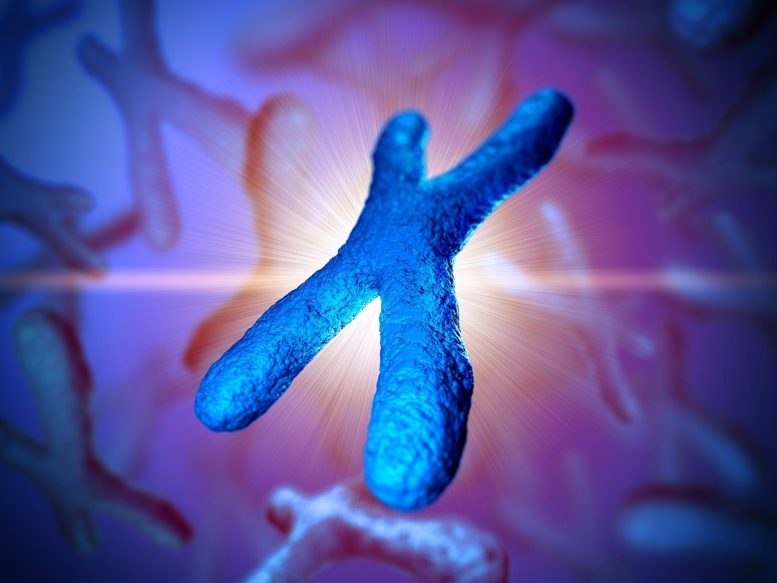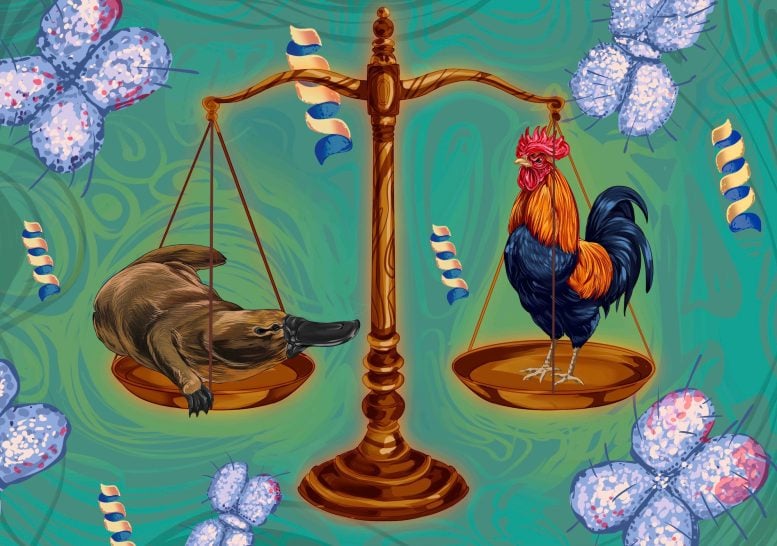
A new study reveals that platypuses and chickens balance protein levels between sexes through a unique dosage compensation mechanism, different from humans, challenging long-standing genetic assumptions and enhancing our understanding of genetic evolution and regulation.
Researchers at UNSW Sydney have uncovered fundamental differences in biological processes between males and females by examining the unique and diverse sex chromosome systems of the platypus and the chicken.
The findings, published in Proceedings of the National Academy of Sciences (PNAS), are a surprise in the field of genetics. The discoveries will help build a better understanding of how sex chromosomes evolved, how our bodies function—and they could lead to new discoveries in biology.
“Mammals, such as humans, have females with two X chromosomes and males with one X chromosome and one Y chromosome, which creates an imbalance between the sexes,” says lead author Dr Nicholas Lister from UNSW’s School of Biotechnology and Biomolecular Sciences. “This imbalance is corrected by a process called sex chromosome dosage compensation.”
Scientists have long known that animals have solutions to balance sex chromosome differences and achieve ‘normal’ function.
Dr Lister says: “In female mammals, such as humans and mice, XX females and XY males have different numbers of the X chromosome. To balance this difference, one of the X chromosomes in females is typically silenced. Silencing one X chromosome in females equalizes the gene products on the sex chromosomes. This prevents females from producing double the number of proteins from the X compared to males.”
Balancing the scales
Every cell in our bodies uses proteins to perform specific functions.
“They are translated from mRNA, which carry the instructions for cells to make proteins,” the study’s research lead, Associate Professor Paul Waters, also from UNSW’s School of Biotechnology and Biomolecular Sciences, says. “Being male or female affects mRNA levels of X chromosome genes, which we would then expect to affect protein production.”

But A/Prof. Waters says this study demonstrates—for the first time—that a balance of proteins occurs between the sexes, even when mRNA levels aren’t balanced.
“The findings suggest that dosage compensation is a crucial process in species with differentiated sex chromosomes to ensure that protein levels are balanced,” he says. “These results are significant as they suggest that dosage compensation of sex chromosomes is essential after all—and across all vertebrate species, not just placental and marsupial mammals.”
Why the platypus and the chicken?
The study focused on the platypus and the chicken—two species with vastly different sex chromosome systems that offer valuable insights into the evolution and mechanisms of dosage compensation.
“Platypus are monotreme mammals, with interesting sex chromosome systems,” Dr Lister says. “They have five pairs of X chromosomes in females and five Xs and five Ys in males. Birds—such as chickens—have a ZW system, where males have two copies of a Z chromosome and females have a Z and a W chromosome.”
A/Prof. Waters says the scientists had already observed near-perfect sex chromosome dosage compensation of RNA between males and females in placental and marsupial mammals.
“However, in birds and monotremes, there is an imbalance of mRNA between the sexes,” he says. “This is something we thought was impossible. For the first time, we show that this imbalance is corrected at the protein level. This means that platypus and chicken have a novel mechanism of dosage compensation that is different from how we humans do it.”
Are our genes really in control?
Co-author Professor Jenny Graves, from the Department of Environment and Genetics at La Trobe University, had demonstrated that genes on the inactive human X chromosome are not copied into RNA back in 1986.
Silencing at the level of RNA then became the paradigm for all epigenetic silencing.
“As the genes were silenced by their failure to make RNA, the control of dosage compensation was assumed to be at the level of RNA only—not at the level of making proteins,” Prof. Graves says.
“But mRNA levels for genes on sex chromosomes weren’t balanced in the platypus or the chicken,” she says. “So, scientists questioned the assumption that dosage compensation is essential for life.”
A/Prof. Waters says that measuring protein levels has been a much trickier endeavor than measuring mRNA levels, due to technological challenges.
“And now that the technology is more sensitive, we can see that the dosage compensation of sex chromosomes between males and females is observed at the protein level in the platypus and the chicken,” A/Prof. Waters says. “The males and females of these species make similar amounts of proteins, despite the discrepancies in mRNA quantities.”
How will this knowledge be applied?
The authors emphasize the complexity of genetic regulation and the importance of considering multiple levels of control in gene expression.
Co-author Dr Shafagh Waters from UNSW’s School of Biomedical Sciences says the study paves the way for a deeper understanding of genetic regulation.
“Studying unique species like the platypus provides us with new insights into the cellular and molecular mechanisms that could regulate various aspects of human physiology, or be implicated in disease states,” she says. “So, while these processes may not directly apply to human dosage compensation, they illuminate how our bodies manage gene expression and protein production. Our findings have the potential to advance knowledge in evolutionary biology and lead to innovative therapies in medical genetics. Understanding these mechanisms across different species can help identify new targets for diseases where protein dysfunction is key.”
Dr Lister says future research will examine the mechanisms that contribute to dosage compensation.
“This work will help us discover other dosage compensation systems in nature,” he says. “We can find out how these evolved and how they work in other species.”
A/Prof. Waters says, “Understanding these processes in other species can enhance our grasp of gene regulation at a fundamental level.”
Reference: “Incomplete transcriptional dosage compensation of chicken and platypus sex chromosomes is balanced by post-transcriptional compensation” by Nicholas C. Lister, Ashley M. Milton, Hardip R. Patel, Shafagh A. Waters, Benjamin J. Hanrahan, Kim L. McIntyre, Alexandra M. Livernois, William B. Horspool, Lee Kian Wee, Alessa R. Ringel, Stefan Mundlos, Michael I. Robson, Linda Shearwin-Whyatt, Frank Grützner, Jennifer A. Marshall Graves, Aurora Ruiz-Herrera and Paul D. Waters, 29 July 2024, Proceedings of the National Academy of Sciences.
DOI: 10.1073/pnas.2322360121
17 Comments
Despite a prevailing political paradigm that the only difference between men and women is a morphology that is ‘outie-centric’ for men, and ‘innie-centric’ for women (even that is denied by some), the ‘discovery’ that there are other important differences is about as startling as ‘discovering’ that water is wet and fire is hot.
You said it all!
Exactly. But then you already know they’ll be like oh it doesn’t matter… Till after their experimenting kills many people and helps society fall apart and people turn on them for pushing unhealthy lies that ruin people bodies for life.
You do realize that this is an article about sex chromosome “dosage regulation” in *platypuses and chickens*, right?
What a surprise! . . . . . . Not!!!!!!@@
No one believes anything you just said, except maybe for crazies like Dismantle the Patriarchy in the post below yours. You guys are both on two far extremes of a topic that has a correct answer that is widely accepted by the scientific community. Xx doesn’t MAKE someone a female, but it does give their bodies the blueprints. A lot of other things have to happen for those blueprints to be properly read and used.
The fundamental assertion of this study, that so-called “males” and so-called “females”, represented by differing genomes, can have biological differences, is rooted in misogynist, hetero-normative, and patriarchal societal norms that seek to perpetuate differences that do not exist. Studies such as this must be suppressed and rejected as incorrect thinking and false science. Humans are unique in that there can be infinite genders irregardless of chromosomal makeup, and with hormonal treatment, which create “male” and “female” in the womb, genetics are now irrelevant. The scientists who produced this study can hardly call themselves scientists.
So ignore all the health and development issues that hurt many as hormones while growing are unbalanced. You know that causes all from brains not developing to disfigured,limbs,sexual reproductive damages right.. and that it’s linked to issues like depression, illness and cancers that can take years after birth to even pop up and can skip generations. Screw your future children tho righ. You fit in with reality deniers now… that’s all that matters right…
Also ironic c l. Cause if we actually hated them like Nazis dud. Wed push to do the same teams surgeries Nazis did to weaken them…as they tried wiping them out…
I think that you managed to get all the appropriate buzz words in! It is progressive Word Salad Sallies like yourself that try to overturn the obvious to advance extremist matriarchal political views who are a threat to society. You are hardly a scientist, although you apparently consider yourself to be one and therefore qualified to judge who is not a scientist. You are promoting Lysenkoism run amuck. However, all you have provided is a personal opinion, without any supporting evidence. Voltaire must be turning over in his grave with your demand to suppress studies you disagree with. What is the opposite of the ‘Age of Enlightenment?’ The ‘Dark Ages!’
You’re as bad as Clyde, but in the totally opposite way. Genetics 100% plays a massive role in how we grow up and go through puberty, to deny otherwise is just ridiculous. Just because it is infinitely more complicated than xx is female and XY is male, doesn’t mean that xx and XY are not great starting points.
She-chicken-platypus Hulk smash gender boundary! XXXXX(YYYYY) ZX was pretty weird! She-chicken-platypus Hulk hope to read GWAS differentials in addition to transcription and folding results. [The croakies holding her glasses scream a bit.]
She-chicken-platypus Hulk look forward to Ero-Ace Buffalo Platypus result clade in wild, that thing can totes throw into compliance asks, but more probably Jen Psaki coverage.
This is scary to think that are hormone than determine if we are male or female is evolving …. Very very scary
The man above me consider himself as a doctor but cannot even create proper statement with correct grammar
Huh! Males and females are different? Who knew??!!??
The actual interesting scientific question here that people aren’t asking is this: How does sex chromosome dosage compensation work in intersex cases?
For example, is the inability of sex chromosome dosage to compensate for a syndrome like Klinefelter’s (XXY genome in Humans) responsible for the differences (to both typical XX and XY cases) seen in those people?
I think the results of looking into that would be really interesting, personally.